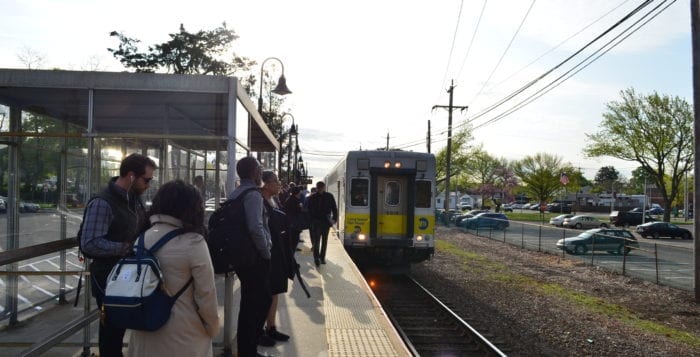Officials Say New Diesel Engines on PJ Line Will Set Back Electrification
MTA: All Projects on Standby, All Contracts in Jeopardy Without Federal Aid

As the MTA prepares its budget for the next few years, potentially reducing a massive amount of service due to the pandemic, local officials are saying some of that money earmarked for the Port Jefferson Branch line can get put to better use.
Though the Metropolitan Transportation Authority has a $12 billion cash shortfall in its 2021 budget, its 2020-24 capital plan still includes plans to purchase new dual-mode (electric/diesel) trains for $150 million to replace older locomotives on several Long Island Rail Road lines, including Port Jeff.

A representative of the MTA could not give any fresh updates on these new trains or other initiatives as all of them are on hold due to economic uncertainty, but whether or not the $16.7 billion annual-expenditure entity gets the aid it needs in time, officials are still against any new diesel trains without electrification first.
For years, area officials from all levels of government have been promoting electrifying the Port Jeff rail line, transforming it into a system like that of Ronkonkoma for faster, greener public transport. That initiative has been ongoing for years.
In March this year, the environmental advocacy group Sierra Club Long Island held a kickoff event for its green transportation initiative, holding one of its events at the Stony Brook train station. Village, town and county officials have stood behind them at this and past events.
Sierra Club Green Issues chair, Mayer Horn, is also a Dix Hills-based transportation consultant and has worked with Port Jefferson Village before. He said purchasing new diesel trains was “a very foolish thing to do.”
Back in December of 2018, Horn published a report on behalf of Port Jefferson about the North Shore rail line which described a general lack of full-time direct service between Port Jeff and Penn Station, and how current dual-mode could be used to provide such service now.
Village trustee Bruce Miller, who has also long advocated for electrifying the Port Jeff line, said replacing the diesel engines was “anathema” to what has long been proposed. It would effectively make it that much harder to argue for modern technology if the old line suddenly had new trains.
Miller has often used the refrain that people all across the North Shore, even as far east as Calverton and as west as Greenlawn, take the longer drive to places like Ronkonkoma rather than catch the closer train, only because it is both less reliable and efficient.
“Basically, you’re not entirely eliminating vehicles or cars when you have these two diesel lines on the North Shore and South Shore,” Miller said. “People aren’t factoring in pollution.”
On Sept. 17, the MTA put out a press release saying all its contracts are in jeopardy if it does not receive the $12 billion stimulus from the federal government. Some of these multibillion-dollar contracts are for companies that create and sell train and rail parts.
The September 2019 presentation of the LIRR’s capital improvement plan had included 160 new electric cars, nearly 20 coach cars and over 10 new locomotives.
Plans have changed due to the pandemic, as the MTA looks to close a $5.8 billion budget gap for 2021. Rail lines like Port Jefferson to Huntington will still run hourly at peak periods, but others with lower ridership will not likely be so lucky. Fares are also expected to increase beyond the anticipated 4% for 2021 through 2024, and riders who are taking trips to the city will feel it in their wallets the most.
Yet the new diesel engines remain on the docket, making local advocates and officials severely question if they are still coming when so much service is getting cut.
In the MTA’s July preliminary budget presentation, it stated that a reduction or delay in the 2020-24 capital program will have a limited impact on the operating budget because, for one, the MTA’s portion is back ended, having already been funded from several tax sources. Using those sources to fund the operating budget instead would “consume cash and reduce liquidity.”
Still, there has been talk of removing some parts of the capital plan. Newsday has reported the MTA has plans to put the $230 million north/south link between the Ronkonkoma and Babylon branches on pause.
There is no money in that capital plan for Port Jeff electrification either.
The 2018 Port Jeff report by Horn notes that the Ronkonkoma line, once the LIRR expanded electrification from Hicksville to Ronkonkoma in 1987, jumped daily trips from 6,200 to 16,000 by 2007, a result of people no longer taking the Port Jeff or Montauk branches to both north and south. Less local traffic also meant a decline in the economic vitality of Upper Port.
These new diesel trains are just another factor of what Horn calls “a real lack of planning.” He lamented why the MTA, or America in general, doesn’t try to learn from countries with much better, faster and more efficient train systems like South Korea or Japan.
The greatest need, however, has been the addition of a third rail for the Port Jeff line, something that has been trumpeted and sometimes praised to be coming soon.
“It looks to me like LIRR is basically telling us that they are going to proceed as if exempt from CLCPA, which is outrageous.”
— Steve Englebright
State Assemblyman Steve Englebright (D-Setauket) has long been a proponent of electrification. As the chair of the Assembly environmental conservation committee, he said he, along with his state Senate counterpart Todd Kaminsky (D-Rockville Centre), met with Phil Eng, the head of the LIRR, late last year to talk about these new trains.
“Quite frankly, he was not able to give us any assurance he was going to do anything but plow ahead,” Englebright said. “That was a couple months before COVID crisis basically created a whole new set of distractions.”
New York State, in the 2019 Climate Leadership and Community Protection Act, has set the lofty goal to limit statewide greenhouse gases to 40% of 1990 levels by 2030, and 85% by 2050.
“It looks to me like LIRR is basically telling us that they are going to proceed as if exempt from CLCPA, which is outrageous,” the local assemblyman said. He added these trains could have a lifespan of 50 years.
In a letter sent to Englebright in March 2019, MTA president, Patrick Foye, said that the LIRR had been reviewing proposals for a $4 million study on Port Jeff electrification and other projects, and that it could be awarding a contract for the electrification study in early summer 2019. That study has not yet materialized and, with the MTA saying it has no updates, it’s likely it won’t any time soon.






